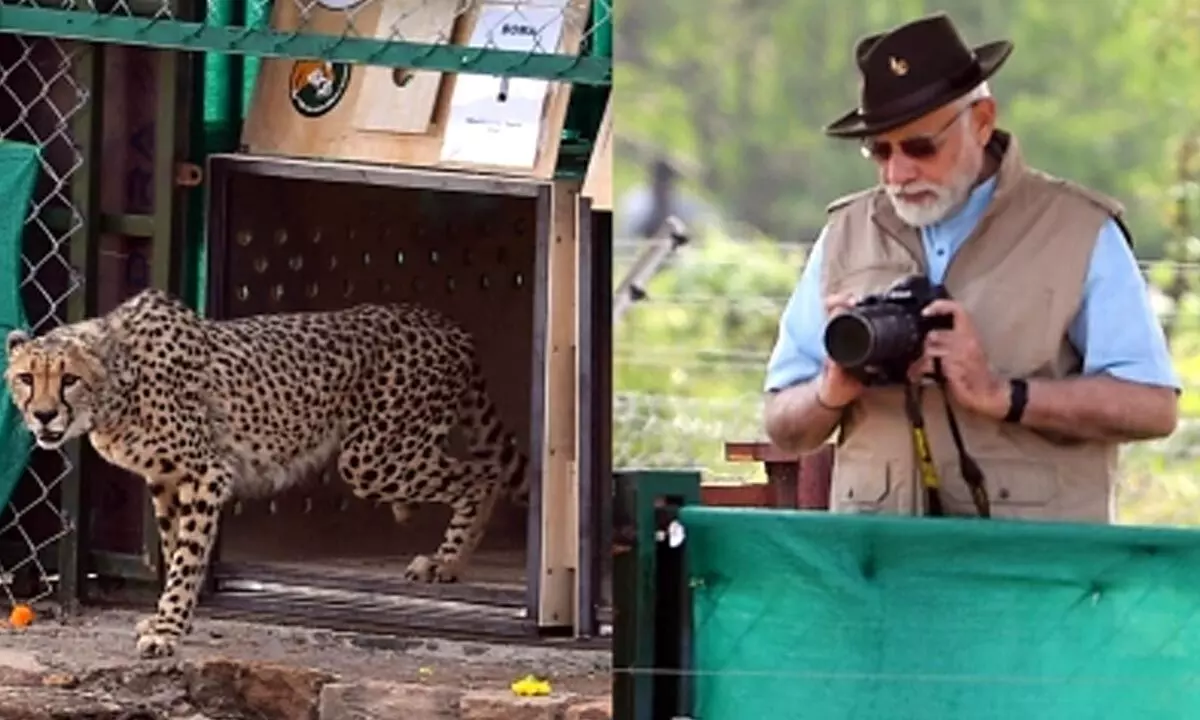Cheetahs back on Indian soil after 70 years: Narendra Modi

Cheetahs back on Indian soil after 70 years: Narendra Modi (Photo/IANS)
Prime Minister Narendra Modi on Saturday said cheetahs are back on Indian soil after 70 years and the move will lead to restoration of forest and grassland ecosystems.
Bhopal: Prime Minister Narendra Modi on Saturday said cheetahs are back on Indian soil after 70 years and the move will lead to restoration of forest and grassland ecosystems.
The Prime Minister released the big cats -- five male and three female, brought from Namibia, into enclosures of Madhya Pradesh's Kuno National Park and termed it endeavour towards environment and wildlife conservation.
Prime Minister Modi said, "Cheetahs had become extinct from the country in 1952, but for decades, no meaningful effort was made to rehabilitate them. Today, as we celebrate 'Azadi ka Amrit Mahotsav', the country has started rehabilitating cheetahs with a new energy."
He said that tourists and wildlife enthusiasts will have to wait a few months before they can see cheetahs at KNP.
"Bringing Cheetahs back to India will help in the restoration of open forest and grassland ecosystems and also lead to enhanced livelihood opportunities for the local community," the Prime Minister added.
He said 'Project Cheetah' is the world's first inter-continental large wild carnivore translocation project.
Notably, the special event was scheduled for September 17 to mark Prime Minister Modi's 72nd birthday.
The felines will be living under an earmarked area of KNP for two weeks after which they will be released in the park.
According to a senior forest officer in Madhya Pradesh: "Cheetahs will be living in an earmarked area under KNP for two weeks. Once they will adapt to the climate of this area, they will be released into the park."
All cheetahs have special radio-collar fitted to their necks so that their movement can be easily located. Their health and movement will be monitored every day by a special joint team of African and Indian wild animals experts," the senior forest officer added.
Spread over 748 square km in the vast forest landscape of Madhya Pradesh, KNP is the new home of the eight cheetahs. Notably, the region is very close to the Sal forests of Koriya in Chhattisgarh, where the native Asiatic Cheetah was last spotted almost 70 years ago.
As per the forest officials in Madhya Pradesh, KNP was chosen as suitable destination for cheetahs after a survey of nearly a dozen national parks located in Madhya Pradesh, Chhattisgarh, Rajasthan, Gujarat, and Uttar Pradesh.
"These surveys were carried between 2010 and 2012. Later, it was observed that Kuno was the suitable destination. It was the most preferred habitat based on the assessment carried out by the Wildlife Institute of India and Wildlife Trust of India (WTI) based on climatic variables, prey densities, population of competing predators, and the historical range," the officer said.
Kuno is probably one of the few wildlife sites in the country where there has been a complete relocation of roughly 24 villages and their domesticated livestock from inside the park years ago. The village sites and their agricultural fields have now been taken over by grasses and are managed as savannah habitats.
According to the government's plan, Kuno offers the prospect of housing four large felines in India -- tiger, lion, leopard and cheetah -- and ensuring they coexist as they did in the past. While the only surviving population of lions is in Gujarat, Kuno was initially proposed to provide a second home.
The forest has a significant population of leopards with a density of about nine leopards per 100 square km. This remains a concern, taking into account, that the much-stronger leopard has an advantage over the slender cheetah, whose strength mainly lies in its blazingly fast speed. They are also believed to have more adaptive potential and a wider habitat than the cheetah.
Madhya Pradesh Governor Mangubhai Pate, Chief Minister Shivraj Singh Chouhan; Union Ministers -- Narendra Singh Tomar, Bhupender Yadav, Jyotiraditya M Scindia and Ashwini Choubey -- were among those present on the occasion.
The Madhya Pradesh Chief Minister on Friday had said, "We were a tiger state, a leopard state and now becoming a Cheetah state."








